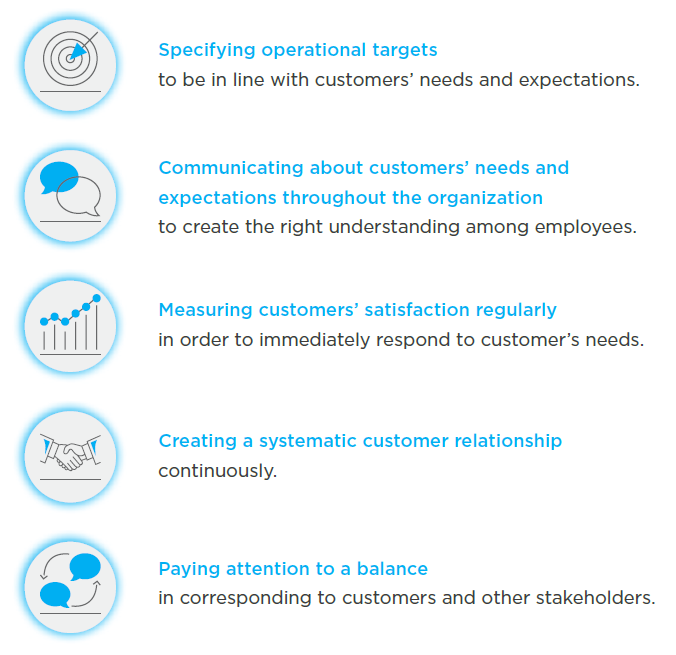Customer & Product Stewardship
Significance
BPP has been committed to producing and supplying power and other forms of energy to ensure quality and stability in accordance with the international standards and customers’ needs. Realizing that BPP’s operations have contributed to the electricity’s system stability and are the important factors for the industrial sector’s production as well as have affected the community’s well-being, it is, therefore, the company’s responsibility in delivering products to meet the customer expectations and conducting its business with honesty, including having standards to protect customer’s data. Moreover, the international operation standards have been employed so as to deliver electricity and other forms of energy meeting the customer’s expectations and enhancing their trust.
Management Approach
Since BPP operates more variety of businesses, customer management differs in each country, such as customers of CHP plants in China, major groups of customers generating income are the government agencies and state enterprises, which are the main power purchasers under the long-term power purchase agreements, as well as the industrial sector buying steam. As a result, the ISO 9001 quality management system standard has been used in customer management in the production units having to deal with a variety of customers. Moreover, the principle of quality management is to focus on customers and to have a process to understand needs and expectations between manufacturers and customers, The important operations carried out are as follows.

Regarding the power trading business in America, since electricity buyers are retail customers with various power demands, BPP focuses on mitigating risks possibly arising such as:
- Establishing a retail risk management policy to serve as a guideline for the retail pricing committee and management team in managing market risks of retail electric providers.
- Setting up a pricing policy to be used as a guideline for setting daily trading prices. The policy requires checking customer’s quotation whether it is accurate or up to date, while maintaining the price difference to be in line with the target set.
- Determining a credit and collection policy to manage credit risk from entering into sales contracts with customers. The policy requires checking whether or not appropriate measures and controls are used in order to gain quality customer groups in the long term. The policy also obligates to limit risks associated with bad debt and write-offs, including curbing losses possibly occurring from data disclosed by the contracting party.
- Utilizing technology to help analyze the market needs to be used for designing packages and prices to meet customer demand.
- Studying retail customer’s credit rating so as to use it as a guideline for analyzing customers’ creditability before entering into a contract.
In addition, BPP also focuses on creating relationships with customers, treating them as the partners of mutual success. This is done by giving high importance to delivering the sustainable value to every customer and taking into account 4 main values as following:
- Product value: Using High Efficiency, Low Emissions (HELE) technology and having an ability to control air and water quality as well as environmental management to meet the international standards in order to create product values.
- Service value: To create service values, BPP has upgraded its production efficiency with availability and reliability aligned with customers’ needs. Its operations are also flexible to reach customers’ demands, including controlling.
- People value: To build people’s values, BPP supports its employees to develop their knowledge and skills and cultivate a corporate culture with qualified staff daring to solve the customers’ problems properly and quickly.
- Reputation value: In order to create a good reputation, BPP operates its businesses professionally in accordance with the code of conduct and good corporate governance.
Furthermore, BPP is closely monitoring legal and policy changes in order to adapt itself to any changes in energy demand from the government sector aiming to reduce greenhouse gas (GHG) emissions from power and energy production. It is also an opportunity to transform the business towards renewable energy and energy technology derived from market demand and government support.
Performance
- Customer’s satisfactory scores equaled to 100%.
- Proportion of customer’s complaints settled in a timely manner was accountable for 100%.
- No customer’s grievances involved with customer’s privacy data protection.
- None of customer’s complaints related to safety and environment of product consumption.
Key Activities and Projects
The Company has offered various channels for receiving complaints from customers such as:
• Consultations with customers in the governmental and industrial sectors within time period upon mutual agreements
• Providing hotlines allowing customers to call for changing the power purchase, requesting for product consultation, including reporting any complaints directly to the production unit
• Emails
• The Company and subsidiaries websites
The Company has established a complaint recording system, tracking and amending system, as well as responding to customers’ complaints in a timely manner. Designating the process of receiving and handling complaints is in accordance with the context of each area. The Combined Heat and Power (CHP) plants in China have handled their customers based on the Quality Management System Standard (ISO 9001)
The Company has conducted the customer satisfaction surveys through various channels, for example:
• An in-depth interview to evaluate customers’ satisfaction to assess particular problems, needs and expectations of customers so as to use the information obtained to improve work processes and production as well as enhancing good relationships with them
• Sending questionnaires to customers for satisfaction scoring
The CHP plants in China have managed customers’ satisfaction by using the Quality Management System Standard (ISO 9001), having frequency to conduct customer satisfaction surveys varying from quarterly to yearly
The Company has put great attention to the significance of safeguarding information receiving from customers in order to prevent damages and build trusts among customers. Policy and guidelines are as follows:
A Use of Information
- The Company uses database on expectation, suggestion and complaints to better improve services, develop operational and production process, as well as create products to respond customers’ needs.
Disclosure of Information to the Third Party
- The Company will disclose customers’ personal information to the third party only with consents from the customers
- The Company will disclose customers’ personal information only when the Company honestly believes that there are necessity and appropriate reasons for the disclosure and in compliance with related laws
Information Security Maintenance
- The Company protects its customers’ personal information from unauthorized access by restricting to authorized staff, employee and representatives who need to use that information for customer service or data processing. As such, those people must strictly comply with regulations of securing confidential data
The Company realizes the significance of customer satisfaction towards business success of the Company. Therefore, the Company has intention to find any methods in response to the customers’ needs more efficiently and effectively at all time. The policies and guidelines have been formulated as follows:
1) Delivering products and providing quality services to meet or exceed the customers’ expectations at fair prices
2) Providing accurate and adequate as well as up-to-date information to customers about products and services without any exaggeration possibly causing customers misunderstanding about quality, quantity or any conditions of certain products or services
3) Strictly complying with conditions towards the customers and if in any events that any conditions cannot be met, customers must be notified to find means of solutions to problems together
4) Contacting with customers with politeness, effectiveness and reliability
5) Providing the system and process for customers to complain about quality, quantity, safety of products and services including timely responding, delivering and executing to the utmost for a quick response to customers
6) Securing customers’ confidentiality and do not use the data for self-benefit or any wrongful related persons
7) Providing advices on user manual regarding the Company’s products and services effectively with the utmost benefit to the customers
BPP has invested in gas-fired power plants and power trading business in the U.S., which is a merchant market and exists in the entire value chain, starting from electricity generation from large power plants to selling power in the wholesale and retail markets, including power trading. This is to drive the business to grow forward. Moreover, BPP sees the importance of using digital technology in managing power production and distribution business in the merchant market. In addition to enhancing knowledge and expertise for employees, the technology is still needed to be developed in order to raise the level of service meeting different customers’ needs and to build good relationships with customers. This has helped BPP expand its customer base and increase the amount of electricity sold and future profits. The digital technologies used in operations are as followings:
- Developing software to store and analyze factors affecting the amount of power supply in the market in order to track movements in the real-time power trading market.
- Using artificial intelligence (AI) to analyze power consumption behaviors of customers in order to design a variety of service packages at reasonable prices. Moreover, AI is also used for responding to customer needs and proceeding with information from social media to increase opportunities to reach the target customers. In addition, AI is used for developing attractive and interesting marketing activities so as to build good relationships with customers.
- Generating power through digital systems, which allows the power plants to flexibly adjust their production capacity levels, corresponding to the rapidly changing merchant market. The digital system also creates opportunities to increase income while the market is faced with electricity shortage. Moreover, it is transparent and can be traced back by releasing production data to the public in real time.
- Using software systems to record, monitor and control emissions from gas-fired power plants with accurate and transparent data that can be traced back.




